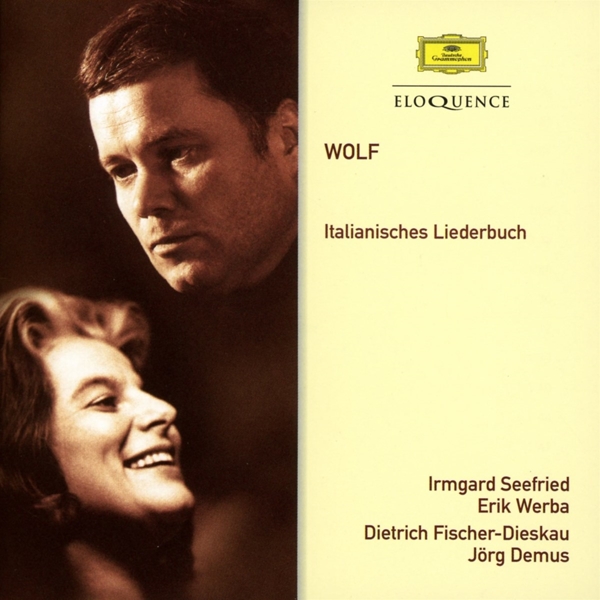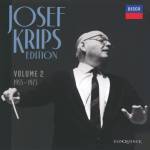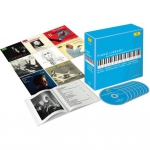| Bemerkungen / Titelliste: |
Italienisches Liederbuch 01. "Nr. 1 Auch kleine Dinge" 01. "Nr. 1 Auch kleine Dinge" 02. "Nr. 2 Nicht l?nger kann ich singen" 02. "Nr. 2 Nicht l?nger kann ich singen" 03. "Nr. 3 Schweig einmal still" 03. "Nr. 3 Schweig einmal still" 04. "Nr. 4 O wüsstest du" 04. "Nr. 4 O wüsstest du" 05. "Nr. 5 Wer rief dich denn?" 05. "Nr. 5 Wer rief dich denn?" 06. "Nr. 6 Hoff?rtig seid ihr" 06. "Nr. 6 Hoff?rtig seid ihr" 07. "Nr. 7 Was soll der Zorn" 07. "Nr. 7 Was soll der Zorn" 08. "Nr. 8 Wie soll ich fr?hlich sein" 08. "Nr. 8 Wie soll ich fr?hlich sein" 09. "Nr. 9 Verschling der Abgrund meines Liebsten Hütte" 09. "Nr. 9 Verschling der Abgrund meines Liebsten Hütte" 10. "Nr. 10 Gesegnet sei, durch den die Welt entstund" 10. "Nr. 10 Gesegnet sei, durch den die Welt entstund" 11. "Nr. 11 Ich esse nun mein Brot" 11. "Nr. 11 Ich esse nun mein Brot" 12. "Nr. 12 Nun lass uns Frieden schließen" 12. "Nr. 12 Nun lass uns Frieden schließen" 13. "Nr. 13 Wenn du, mein Liebster" 13. "Nr. 13 Wenn du, mein Liebster" 14. "Nr. 14 Wir haben beide lange Zeit geschwiegen" 14. "Nr. 14 Wir haben beide lange Zeit geschwiegen" 15. "Nr. 15 Was für ein Lied" 15. "Nr. 15 Was für ein Lied" 16. "Nr. 16 Mein Liebster singt" 16. "Nr. 16 Mein Liebster singt" 17. "Nr. 17 Selig ihr Blinden" 17. "Nr. 17 Selig ihr Blinden" 18. "Nr. 18 Wohl kenn' ich euren Stand" 18. "Nr. 18 Wohl kenn' ich euren Stand" 19. "Nr. 19 Benedeit die sel'ge Mutter" 19. "Nr. 19 Benedeit die sel'ge Mutter" 20. "Nr. 20 Man sagt mir" 20. "Nr. 20 Man sagt mir" 21. "Nr. 21 Sterb'ich, so hüllt in Blumen" 21. "Nr. 21 Sterb'ich, so hüllt in Blumen" 22. "Nr. 22 Mir ward gesagt" 22. "Nr. 22 Mir ward gesagt" 23. "Nr. 23 Und willst du deinen Liebsten" 23. "Nr. 23 Und willst du deinen Liebsten" 24. "Nr. 24 Schon streckt' ich aus" 24. "Nr. 24 Schon streckt' ich aus" 25. "Nr. 25 Heut' Nacht erhob ich mich" 25. "Nr. 25 Heut' Nacht erhob ich mich" 26. "Nr. 26 Heb' auf dein blondes Haupt" 26. "Nr. 26 Heb' auf dein blondes Haupt" 27. "Nr. 27 O w?r' dein Haus durchsichtig" 27. "Nr. 27 O w?r' dein Haus durchsichtig" 28. "Nr. 28 Und steht ihr früh am Morgen auf" 28. "Nr. 28 Und steht ihr früh am Morgen auf" 29. "Nr. 29 Gesegnet sei das Grün" 29. "Nr. 29 Gesegnet sei das Grün" 30. "Nr. 30 Dass doch gemalt" 30. "Nr. 30 Dass doch gemalt" 31. "Nr. 31 Wenn du mich mit den Augen streifst" 31. "Nr. 31 Wenn du mich mit den Augen streifst" 32. "Nr. 32 Ihr jungen Leute" 32. "Nr. 32 Ihr jungen Leute" 33. "Nr. 33 Der Mond hat eine schwere Klag" 33. "Nr. 33 Der Mond hat eine schwere Klag" 34. "Nr. 34 Du denkst mit einem F?dchen" 34. "Nr. 34 Du denkst mit einem F?dchen" 35. "Nr. 35 Geselle, woll'n wir uns in Kutten hüllen" 35. "Nr. 35 Geselle, woll'n wir uns in Kutten hüllen" 36. "Nr. 36 Mein Liebster ist so klein" 36. "Nr. 36 Mein Liebster ist so klein" 37. "Nr. 37 Ein St?ndchen euch zu bringen" 37. "Nr. 37 Ein St?ndchen euch zu bringen" 38. "Nr. 38 Nein, junger Herr" 38. "Nr. 38 Nein, junger Herr" 39. "Nr. 39 Ihr seid die Allersch?nste" 39. "Nr. 39 Ihr seid die Allersch?nste" 40. "Nr. 40 Wie lange schon" 40. "Nr. 40 Wie lange schon" 41. "Nr. 41 Wie viele Zeit verlor ich" 41. "Nr. 41 Wie viele Zeit verlor ich" 42. "Nr. 42 Mein Liebster hat zur Tische" 42. "Nr. 42 Mein Liebster hat zur Tische" 43. "Nr. 43 Ich ließ mir sagen" 43. "Nr. 43 Ich ließ mir sagen" 44. "Nr. 44 Du sagst mir" 44. "Nr. 44 Du sagst mir" 45. "Nr. 45 Lass sie nur gehen" 45. "Nr. 45 Lass sie nur gehen" 46. "Nr. 46 Ich hab' in Penna einen Liebsten wohnen" 46. "Nr. 46 Ich hab' in Penna einen Liebsten wohnen"
|
 |
| Anzahl der Tonträger: |
1 |
 |
| Beschreibung: | Perhaps no pair of singers on record has interpreted this cycle of 46 songs with such natural accomplishment as Irmgard Seefried and Dietrich Fischer-Dieskau. They made this recording near the end of the 1950s - at the height of Seefried's career and near the start of Fischer-Dieskau's, and it's qualities of both freshness and delight in response to the text and vocal beauty have stood the test of time. The singers performed the cycle together live at the 1958 Salzburg Festival to an ordering devised by the pianist for the occasion and Seefried's regular accompanist, Erik Werba. In the DG studios a few months later, however, Fischer-Dieskau was joined by his own regular instrumental partner at the time, Jörg Demus. Meanwhile the subtly different responses of both pianists - Werba fuller-toned than Demus, whose pointed articulation owes something to his work on 'period' instruments - offer food for both thought and pleasure. Without attempting to concoct a storyline, Werba's ordering allows the poetry's depictions of woman and man to contrast with and complement each other. A spirited opening group is followed by one which is predominantly lyrical, illustrating the need for love, the woman's surrender and then wavering, a manly longing for death, a farewell, and appeal to sworn fidelity. The closing section juxtaposes a declaration of love, humor, mockery, caricature, resignation and finally boasting, with the soprano's jubilant 'confession' that she has 21 lovers. All four musicians fully bring to life the emotions of elation, joy, anger and irony in Wolf's songs. Fischer-Dieskau's second recording (with Elisabeth Schwarzkopf and Gerald Moore for EMI) is justly famous in it's own right, but the magic of this DG recording lies in the unaffected ease of his partnership with Seefried., Runningtime: 00:00:00, Labelcode ELOA8405565.2 |
 |
| Herstellernummer: |
ELQ4840556 |
 |
Details zur Produktsicherheit
Verantwortliche Person für die EU:
Importeur: Klassik Center
Dr. Rainer Kahleyss
Glöcknerpfad 47, 34134 Kassel, DE
info@classicdisc.de |
 |





















